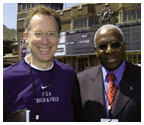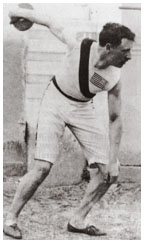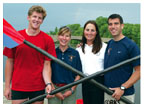June 9, 2004: Sports
Staying on track
Craig Masback ’77 works to steer U.S.A. Track and Field through
controversy
Rowing for gold
Crew alumni compete for Olympic teams
Sports Web Exclusives! P-nut Gallery column
Sports Scores — Updated weekly

Craig Masback ’77, left, and Lamine Diack, president of track’s international governing body, witnessed a three-day crowd of 112,000 at April’s Penn Relays in Philadelphia. (USATF/The Sporting Image) |
Staying
on track
Craig Masback ’77 works to steer U.S.A. Track and Field
through controversy
By Michael Goldstein ’78
Three years after taking over as the C.E.O. of U.S.A. Track and Field (U.S.A.T.F.), Craig Masback ’77 watched U.S. track athletes claim 10 gold medals at the 2000 Sydney Olympics, the most for any nation that year. Stars such as Maurice Green and Marion Jones helped to bring American track back into the headlines. But with this year’s Olympic trials one month away, the media focus on track has shifted from medals to steroids, a development that frustrates Masback, one of the sport’s most renowned marketers.
“The vast majority of athletes – 90 percent – don’t even contemplate cheating,” Masback says. “Perhaps 10 percent consider it. Seven percent are deterred by the testing. That leaves the 2 or 3 percent who are willing to listen to a coach or lab guru [promoting steroid use]. From that subgroup, there are athletes who are willing to risk it.”
Masback, who understands the need for clean competition, knows what athletes endure as they train. After starring at Princeton and studying at Oxford on a Keasbey Foundation Fellowship, he became the U.S. indoor mile champion in 1980 (the U.S. Olympic boycott year) and the American record-holder in the 2000 meters. His best mile — 3:52 —ranked sixth in the world. Masback left track to attend Yale Law School but stayed connected to his sport, working as a commentator for NBC at the Barcelona and Atlanta Olympics.
Track’s proactive drug-testing policies, Masback says, have created an unfortunate backlash. “We started drug testing when no one else was,” he says. “Now we have a reputation as having a drug problem. We’ve busted more people than anybody else, therefore we are associated with bad news.” Bad news has been plentiful in the nine months since U.S. antidoping officials identified tetrahydrogestrinone, or T.H.G., a designer steroid produced by the Bay Area Laboratory Co-Operative (Balco). Track stars, including Jones, Regina Jacobs, and Tim Montgomery, were among the first athletes mentioned in the Balco investigation. American sprinter Kelli White was barred from the Olympics in May, and Masback recognizes that the heat is inescapable. President Bush even attacked the use of performance-enhancing drugs in sports in his 2004 State of the Union address.
U.S.A.T.F. has adopted a “zero-tolerance” policy during Masback’s tenure, addressing the concerns of the International Olympic Committee and the U.S. Olympic Committee. With stringent testing already in place, Masback believes the steroid chatter will subside long enough for fans to enjoy the Athens Olympics. “Once the competition begins,” he says, “people will concentrate on that.”
Despite the negative publicity, there are signs that things are turning around for track and field in the U.S., thanks in part to Masback’s leadership. Attendance at track meets is up – a record 112,000 people attended the three-day Penn Relays in Philadelphia this year – and television ratings are also rising. Accord-ing to the Boston Globe, track coverage on ESPN posted an 80 percent ratings increase during the last six years, a period that corresponds almost exactly with Masback’s tenure. NBC is broadcasting seven track meets this year, and sponsors like Nike have signed on through 2009.
But for track’s growth to continue, its stars will have to inspire
future generations of athletes. As a child, Masback says he read stories
about overcoming adversity in the biographies of Olympic heroes such as
Jesse Owens and Jim Thorpe. He later learned that heroes are never as
perfect as they appear in books, but that, he says, does not negate the
lessons they teach. “There is still a place for athletic heroes,”
Masback wrote recently, “if we focus on the many positives that
so many of them have to offer us.” ![]()
Michael Goldstein ’78 is a journalist and media trainer in Encino, California.

Photo: Princeton archives |
Princeton in Athens, 1896
Robert Garrett, Class of 1897, left, thrilled the world by “beating the Greeks at their own game” – the discus – at the first modern Olympiad. With another first in the shot put, a second in the long jump, and a third in the high jump, he became the premier athlete at that premiere meet. Garrett was one of four Princeton juniors to travel to Athens. Together they outscored most of the nations represented.
But Garrett and his three teammates were not America’s best athletes;
they went almost by default. After several athletic associations backed
off because of the cost of the excursion, Princeton classics professor
William M. Sloane persuaded the four Princetonians to make the voyage
so America would be represented. Even they were in doubt about funding
until, shortly before the departure date, an anonymous bequest was announced.
Years later the donor’s name was revealed: Alice Whitridge Garrett,
the mother of Robert Garrett. ![]()
— By Stephen R. Dujack ’76, excerpted from a story in the December 17, 1979, issue of PAW.

From left, Chris Ahrens ’98, assistant women’s coach Lori Dauphiny, Lianne Bennion Nelson ’95, and Paul Teti ’01 have their sights set on Athens. (Beverly Schaefer) |
Rowing
for gold
Crew alumni compete for Olympic teams
Rower Paul Teti ’01 started training with the U.S. Junior National team when he was in high school, competing alongside some of the sport’s best young athletes. But he made his greatest progress at Princeton, in the company of teammates who ranged from freshman novices to aspiring Olympians. “It was so competitive at the boathouse,” he says. “You couldn’t help but get better.”
Teti’s rapid rise earned him a spot on the U.S. Olympic men’s lightweight straight four in 2000, and at age 27, he feels that his best rowing is still ahead of him. He is one of a dozen Princeton crew alumni, coaches, and students vying for a trip to the Athens Olympics this August. Whether rowing on Lake Carnegie or in international competition, the athletes maintain the boathouse connections that nurtured their development.
Teti swaps telephone pep talks with former teammate Tom Herschmiller ’01 of the Canadian men’s lightweight straight four. Four-time U.S. Olympic Team coach Curtis Jordan, the head coach of the Princeton heavyweight men, keeps tabs on a host of alumni at the nearby U.S. Rowing Training Center on Mercer Lake. And Canadian rower Andreanne Morin ’06 sends e-mail messages to stay in touch with women’s open crew coach and U.S. Olympic Team assistant Lori Dauphiny.
Morin, who was just 19 when she made her first senior national team, has missed three semesters of coursework to prepare for the Olympics. “At the time [I left], of course, I had no guarantee of what would happen – it was a huge dilemma,” says Morin, the youngest rower in her boat. But the decision seems to be paying off: She won a silver medal in the open eight at the 2003 World Championships, and Canada should be a medal contender in Athens as well.
Alumni auditioning for the Olympic boats have different sacrifices to think about, including the impact that a year of training may have on their careers. According to Dauphiny, the commitment and tenacity that make Princeton student-athletes succeed in college help them to juggle work and training as well. “[Princeton rowers] are the type of people who choose the hard way and take on challenges,” she says.
The 2004 Olympic hopefuls include former Olympians Teti, Herschmiller, Chris Ahrens ’98, and Lianne Bennion Nelson ’95; recent graduates John Cranston ’03 and Lia Pernell ’03; and Morin, the only current student in the group. The Flickinger brothers, Jason ’99 and Mark ’01, are prospects in the men’s heavyweight events, and Simon Carcagno ’98 will compete for a spot in the lightweight pair, in which he won a bronze medal at the 2003 World Championships. Danika Harris ’95 helped the U.S. women’s quad qualify for the Olympics and hopes to be back in the boat in Athens.
For John Wachter ’04, a 2003 national team member who has Olympic
dreams for 2008, seeing alumni train for Athens reinforces the dedication
and work ethic he has learned in four years of rowing. “There’s
so much to inspire you,” he says. “Princeton is a place where
rowers have come and matured, excelled, and have been able to reach that
next level.” ![]()
By B.T.

Sports SHORTS
WOMEN’S LACROSSE completed the program’s first undefeated regular season with close wins against Brown May 1 and Maryland April 28. In the Maryland game, Tara Hardiman ’04 converted the game-winner with 17 seconds left in overtime off a pass from Theresa Sherry ’04. MEN’S LACROSSE defeated Brown 9—6 May 8 to finish the regular season 9—3 and earn a share of the Ivy title. The Tigers entered the N.C.A.A. Championships as the No. 6 seed.
Aaron Prince ’07 singled with the bases loaded in the bottom of the 10th inning to lead BASEBALL to a 2—0 sweep against Dartmouth in the Ivy League Championship Series May 8. Will Venable ’05 had three hits in each game as the Tigers clinched a second consecutive trip to the N.C.A.A. playoffs.
At the Ivy Heptagonal Championships May 8—9, MEN’S TRACK AND FIELD finished third and WOMEN’S TRACK AND FIELD finished fourth. Men’s assistant coach Mike Brady, who also served as head coach of men’s cross-country, announced his retirement after 12 years at Princeton.
In CREW, the women’s open eight continued its Ivy unbeaten streak, outpacing Radcliffe to win the championship at the Eastern Sprints. The men’s heavyweight varsity eight finished second.
Louise Gengler ’75, who is retiring, won her final match as coach of WOMEN’S TENNIS when the Tigers defeated Columbia 4—3 April 25.
Guy Gadowsky was introduced as the head coach of MEN’S
HOCKEY May 7. Gadowsky turned a losing Alaska Fairbanks program
into the nation’s 11th-ranked team in five seasons. Gary Walters
’67, director of athletics, hopes he can do the same for the Tigers.
“We have some challenges in restoring momentum to the hockey program,”
Walters said. “The University looks forward to working with Guy
in starting that process.” ![]()
By B.T.
Click here to read From the P-Nut Gallery by sports columnist Nate Sellyn ’04.

Body copy goes here. ![]()

Body copy goes here. ![]()

Body copy goes here. ![]()

Body copy goes here. ![]()

Body copy goes here. ![]()

Body copy goes here. ![]()



